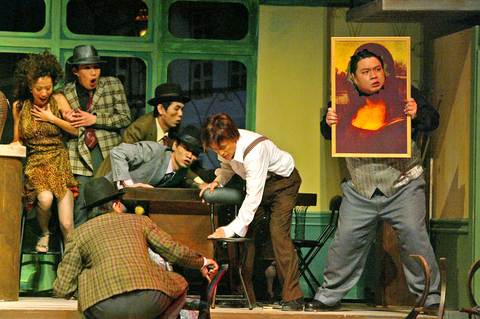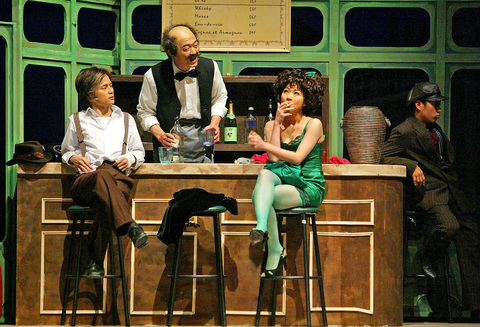Godot Theater (果陀劇場) seems to work in pairs. Having staged two Peter Shaffer plays back in 2001, the theater troupe has investigated the comic oeuvre of Billy Wilder over the past year first with The Apartment, performed in June of last year, and tonight its production of Irma la Douce will hit the stage at the National Theater.
Originally a French musical by Alexandre Breffort, the English-language version premiered in London's West End in the summer of 1958 and ran for more than 1,500 performances. The musical moved on to Broadway in 1960 and was an immediate smash winning Elizabeth Seal the 1961 Tony Award for Best Actress in a Musical. It ran for 525 performances.
The movie version, loosely based on the original musical and adapted by Wilder, tells the story of a naive beat cop named Nestor Patou on the streets of Paris who busts a whorehouse close to where prostitute Irma la Douce plies her trade. Unbeknownst to the innocent Patou, his boss is enjoying the services of the

PHOTOS COURTESY OF GODOT THEATER
establishment when the unauthorized bust goes down and eventually loses his job.
Obsessed with the injustice of losing his job, Patou returns to the Rue Casanova where he befriends la Douce at Chez Moustache, a cafe of questionable repute named after the owner who sports a prominent mustache. While in the bar, the hapless Patou luckily kills off la Douce's pimp and, like the original musical, takes on the role of her principal client (through a disguise) by working long hours during the day, and pimping at night.
The romantic comedy is mainly about how passion and jealousy can lead to bloodshed and how an upright policeman like Patou can suddenly lose his moral scruples due to circumstance. The role of Patou will be played by Bacy Tang (唐從聖) — the great imitator of Taiwanese politicians — and la Douce is played by Ting Hsiao-chin (丁小芹).

To lighten the moral undertones of the play, Godot founder James Liang (梁志民) adapted a script that emphasizes the moral ambiguity of the cafe owner, played by veteran comic actor Chin Shih-jie (金士傑).
"We chose Chin to play the role of cafe owner because of his comic genius," said Sean Yeh (葉向華), Godot Theater's promotional manager.
"The role requires versatility because the actor has to believe in the twisted and comic logic of the cafe owner."

Like the movie version, the script adapted by Liang dispenses with the musical numbers but adds a chorus as a tribute to the original musical and to offer moral balance to the prostitute-filled streets of 1960s Paris.
To add verisimilitude to the play, stage designer Li Shih-chi (黎仕祺) constructed a set that recreates the seedy streets of the city of love. According to Yeh, the set will transport the audience from contemporary Taipei to raunchy Paris.
He adds the passion, jealousy and violence that are hallmarks of both the musical and movie are well adapted to this stage version, which will climax in a denouement that will leave audiences surprised and satisfied.

On April 26, The Lancet published a letter from two doctors at Taichung-based China Medical University Hospital (CMUH) warning that “Taiwan’s Health Care System is on the Brink of Collapse.” The authors said that “Years of policy inaction and mismanagement of resources have led to the National Health Insurance system operating under unsustainable conditions.” The pushback was immediate. Errors in the paper were quickly identified and publicized, to discredit the authors (the hospital apologized). CNA reported that CMUH said the letter described Taiwan in 2021 as having 62 nurses per 10,000 people, when the correct number was 78 nurses per 10,000

As we live longer, our risk of cognitive impairment is increasing. How can we delay the onset of symptoms? Do we have to give up every indulgence or can small changes make a difference? We asked neurologists for tips on how to keep our brains healthy for life. TAKE CARE OF YOUR HEALTH “All of the sensible things that apply to bodily health apply to brain health,” says Suzanne O’Sullivan, a consultant in neurology at the National Hospital for Neurology and Neurosurgery in London, and the author of The Age of Diagnosis. “When you’re 20, you can get away with absolute

May 5 to May 11 What started out as friction between Taiwanese students at Taichung First High School and a Japanese head cook escalated dramatically over the first two weeks of May 1927. It began on April 30 when the cook’s wife knew that lotus starch used in that night’s dinner had rat feces in it, but failed to inform staff until the meal was already prepared. The students believed that her silence was intentional, and filed a complaint. The school’s Japanese administrators sided with the cook’s family, dismissing the students as troublemakers and clamping down on their freedoms — with

As Donald Trump’s executive order in March led to the shuttering of Voice of America (VOA) — the global broadcaster whose roots date back to the fight against Nazi propaganda — he quickly attracted support from figures not used to aligning themselves with any US administration. Trump had ordered the US Agency for Global Media, the federal agency that funds VOA and other groups promoting independent journalism overseas, to be “eliminated to the maximum extent consistent with applicable law.” The decision suddenly halted programming in 49 languages to more than 425 million people. In Moscow, Margarita Simonyan, the hardline editor-in-chief of the